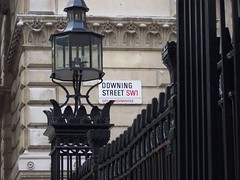 Image by Mrs. Knook via Flickr
Image by Mrs. Knook via Flickr“We the undersigned petition the Prime Minister to urgently review the way LGBT asylum seekers are treated.”Details of Petition
“In the light of the cases of Pegah Emembakhsh and Mehdi Kazemi, Iranian LGBT asylum seekers, who sought asylum in the UK, we call upon the Prime Minister for an urgent review of the treatment of all LGBT asylum seekers. In particular we think that the following are needed for fair treatment - 1. Compulsory training for all asylum staff on sexual-orientation and trans-awareness. 2. Explicit instructions to all immigration and asylum staff, and asylum judges, that homophobic and transphobic persecution are legitimate grounds for granting asylum. 3. Clearer and up-to-date guidance from the Home Office for asylum judges to reflect the accurate scale of LGBT persecution throughout the world using expert information from NGOs like Amnesty International and Human Rights Watch. 4. Legal-aid funding for asylum claims needs to be substantially increased.”
The Government’s response
Thank you for your e-petition requesting an urgent review the treatment of lesbian, gay, bi-sexual and transgender (LGBT) asylum seekers.
In accordance with our international obligations, the Government is fully committed to providing protection to all individuals who need it. We have backed this promise with a considerable investment in people and processes in order to deliver a fairer and faster asylum system. This includes a 55 day foundation training programme for new asylum case owners followed by ongoing learning and development activities. Consideration of applications from people expressing a fear of persecution on the grounds of being lesbian, gay, bisexual or a transgender person is explicitly covered in the training. This is reinforced by clear written instructions for decision-makers. Decision-makers are also supported by accurate, objective and regularly updated country specific information. Similarly, Immigration Judges all receive full training in diversity and refugee law and carry out their assessment of refused claims impartially, on behalf of the courts.
Each asylum and human rights claim is considered on its individual merits in accordance with our obligations under the 1951 UN Refugee Convention and the European Convention on Human Rights (ECHR). Decision-makers in the UK Border Agency have clear instructions about the criteria they must apply and how they should reach a decision. If an applicant demonstrates a need for international protection and they meet the definition of a refugee under the terms of the 1951 Convention, asylum is granted. If they are otherwise vulnerable they may engage our obligations under the ECHR, in which case they will be granted Humanitarian Protection or Discretionary Leave. If their application is refused, they have a right of appeal to the Asylum Immigration Tribunal or an opportunity to seek judicial review through the higher courts. Asylum Instructions setting out the detailed procedures and criteria for deciding asylum applications are published on the UK Border Agency website at: http://www.ukba.homeoffice.gov.uk/policyandlaw/guidance/asylumprocess/
To maintain a high standard of decision quality, a Quality Audit team assess 20% of decisions made across the regional asylum teams, using an assessment form designed jointly with the United Nations High Commissioner for Refugees (UNHCR), and feed back findings to decision-makers and managers. The UNHCR currently conduct random peer reviews of the Quality Audit team’s assessments. We recognise that the conditions for lesbian, gay, bisexual and transgender people in some countries are such that there may be individuals who are able to demonstrate a need for international protection – instructions to decision-makers are clear that they may qualify for asylum on the grounds of persecution as a member of a particular social group.
However, we do not accept that there should be a presumption that each and every asylum seeker of a particular nationality who presents themselves as being lesbian, gay, bisexual or transgender should automatically be afforded protection in the UK. It is in keeping with the terms of the Refugee Convention that every case is assessed individually on the basis of all the available information against the Refugee Convention and ECHR criteria.
Legal aid funding is designed to help those who can least afford to pay to obtain legal advice, assistance and representation when necessary. There is no nationality or residence qualification for receiving either civil or criminal legal aid. The Legal Services Commission (LSC) administers the legal aid system in England and Wales. The LSC is a non-departmental public body sponsored by the Ministry of Justice. We do not believe that the current funding arrangements are inadequate.

![Reblog this post [with Zemanta]](http://img.zemanta.com/reblog_e.png?x-id=8d1b545e-fb01-48d3-8d9d-6318e98725c7)






 Join our page
Join our page


0 comments:
Post a Comment